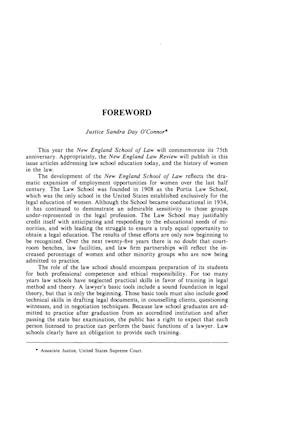By Justice Sandra Day O'Connor
Foreword (to Commemorative Edition: 75th Anniversary of New England School of Law)
January 1983

DISCLAIMER: This text has been transcribed automatically and may contain substantial inaccuracies due to the limitations of automatic transcription technology. This transcript is intended only to make the content of this document more easily discoverable and searchable. If you would like to quote the exact text of this document in any piece of work or research, please view the original using the link above and gather your quote directly from the source. The Sandra Day O'Connor Institute does not warrant, represent, or guarantee in any way that the text below is accurate.
Article Text
(Excerpt, Automatically generated)
FOREWORD
Justice Sandra Day O'Connor*
This year the New England School of Law will commemorate its 75th anniversary. Appropriately, the New England Law Review will publish in this issue articles addressing law school education today, and the history of women in the law.
The development of the New England School of Law reflects the dra matic expansion of employment opportunities for women over the last half century. The Law School was founded in 1908 as the Portia Law School, which was the only school in the United States established exclusively for the legal education of women. Although the School became coeducational in 1934, it has continued to demonstrate an admirable sensitivity to those groups under-represented in the legal profession. The Law School may justifiably credit itself with anticipating and responding to the educational needs of mi norities, and with leading the struggle to ensure a truly equal opportunity to obtain a legal education. The results of these efforts are only now beginning to be recognized. Over the next twenty-five years there is no doubt that court room benches, law facilities, and law firm partnerships will reflect the in creased percentage of women and other minority groups who are now being admitted to practice.
The role of the law school should encompass preparation of its students for both professional competence and ethical responsibility. For too many years law schools have neglected practical skills in favor of training in legal method
